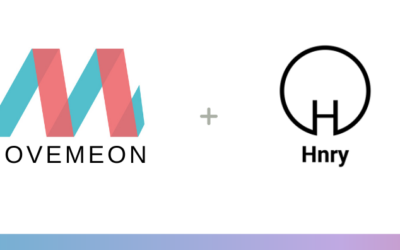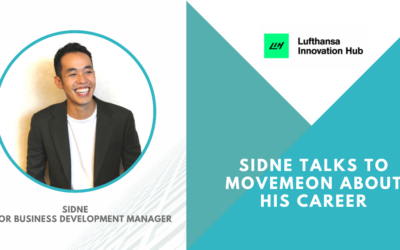Andrew Helms, the Managing Director – USA at SumUp shares his career journey and his experience using Movemeon.com
Interested in working at SumUp? Click here to view live roles
—
Please tell us a bit about your career. I saw that you used to work at Deloitte, so it’d be great to hear how you ended up in consulting, what led you to work at the Dubai World Trade Center and then at the Home Chef as well.
It’s been a long journey. I actually grew up here in Colorado. I left about 18 years ago for college and then grad school and traveling around and ended up doing my Master’s in Arab Studies. After that, I moved out to the Middle East; Egypt, where I was doing some language study and some journalism, amongst other things. While there, I had applied to a job in Dubai in management consulting, with what was Monitor Group at the time – before they were bought by Deloitte.

I did about three years at Monitor Group, working in the standard management consulting way: across regions, on different projects, in the public and private sector… I really enjoyed it! And then they were bought by Deloitte, and I found that to be a natural transition point, so when the opportunity at the Dubai World Trade Centre came up, it just made sense. That was a bit more of a corporate strategy role, specifically focused on running a business as opposed to short consulting projects.

I was at the DWTC for about 3 years, focused on lots of things, everything from corporate strategy (corporate planning, new business development, & optimisation) to real estate – I even opened a restaurant when I was there. At that point I had been in the Middle East for about eight years total, and was ready for a change. I had met my partner out there as well, who’s from Spain, and we were looking to see where we wanted to settle down. We ended up looking at the US, and then decided to go for Chicago, where I had some family. He works for BCG and he got transferred out there, and I ended up at a startup, which is Home Chef.

Home Chef is a meal kit company with similarities to HelloFresh or Blue Apron. With that move, I was looking for more impact, and to be able to develop a broader skillset, and get a bit more scrappy. I was a bit tired of bureaucracy, and looking for a much smaller, nimble startup. When I started, there were 30 people in a room; I loved it! And then, four and a half years later, we sold to Kroger, which is a very large grocery company in the US. We scaled up from being quite small to being much larger over a couple of years, and grew from 30 of us in the corporate office to probably 300 over that same time period. I learned a lot in that growth phase, but I was still looking to get back to my scrappier startup roots, that’s what excited me more.

That’s where I was when you reached out to me about SumUp, and I thought the company sounded really interesting, but I have no finance experience, so they’re not going to want me… and here we are! It worked out very well.
Could you talk a bit about applying for a role during the pandemic? What led you to apply during a difficult time for job changes?
I was very much at the passive job hunting stage. I was actually thinking, next year, I’ll start looking elsewhere; just opening some conversations. I was also thinking of staying in Chicago; I certainly wasn’t planning to move across the US. But then you reached out about SumUp, and all the interviews I had with the team just went very well. I love the people, and the role is very interesting. I was happy to get back to a more international component as well; that was very attractive to me.
Home Chef was great, but it was very Midwest US. So really it was a coming together of fortunate events. If the role had been in rural Kansas or some other part of the US I had no history with, and where I didn’t have family, I probably wouldn’t have jumped at the opportunity. But Colorado was another story. I have history there. I’ve got family there. I’ve got a one-year-old, so I’ve got babysitters built-in! Things just kind of worked out.
And how would you describe the overall experience of looking for a job during the pandemic?
I’ve always found that the best time to look for a job is when you’re already in a job that you’re happy with because it just takes away all the stress of having to put high hopes in all the ones you’re applying for. I think in that sense it was good timing because I could have continued at Home Chef.
Thinking more broadly, I think it was easier to apply during the pandemic. You no longer have to deal with the significant logistics of finding time when someone’s in the office to go visit them. You just schedule the call for when it works for both of you. In a non-pandemic world, I would probably have flown out to Colorado once or twice. Without the need to coordinate with the physical schedules of multiple people, everything could move much faster.
I think, between each interview, it was, three, four days as opposed to three, four weeks while they’re figuring out when this person can meet you in person. So, in some ways, it was actually much easier.
If you had to give any advice to other people who were looking for a role, and feeling the impact of the pandemic, what would your advice be?
Good question. From being on the other side of the market, where I was still actively hiring for roles in Home Chef, I would say that it’s an interesting market right now. I think it leveled out a bit more.Two years ago, for example, we were dying to find good talent and you would have to pay premium dollar. We’ve now seen the opposite; there are just a lot of really talented, good people in the market who are either looking for a new job or out of a job.
I’d actually say it’s a better market. Now, this is not the advice that I’d want to hear, but for the companies, as opposed to the people that are job hunting, there are a lot of solid employees in the market. On the flip side, I think that’s an opportunity for those who are hunting around for jobs where companies are still hiring. Companies are looking for great talent. Companies are looking for people who have solid well-rounded skill sets. I think it actually is a pretty solid time to move companies. Not without its challenges in terms of work from home and distance and everything, but, I think that the demand still seems to be there.
How did you find the experience of starting remotely?
lt was relatively smooth. I think in this case, because of the role they were willing to give me a computer ahead of my contract starting. I was able to do a lot of onboarding and pre-reading ahead of time. I officially started on the 4th January, and I’ve been going to the office twice a week. It’s relatively empty, but just nice to connect.
And on any given day, I’m talking to someone in Berlin, Brazil; all over the world, so we just don’t have that much of this physical need to be in one spot to get work done or to learn something. As a result, SumUp was already better positioned to help onboard new employees remotely. That being said, I think that there definitely will be an advantage of, in a post COVID world, getting people back in the office, collaborating, learning from one another. That’s not going to go away.
Do you have any advice for employers who are looking to do remote onboarding?
Yes, it’s helpful to have clear expectations of the onboarding process. Not from a document perspective, but maybe a list of 30 people I should set 30 minutes with over the next two weeks. Right. It’s just the relationship aspect that you don’t get when you’re working from home as much as you would if you were just in the office, where you’d bump into someone and you’d meet new people.

Click here for more insight into other organisations hiring on Movemeon.com


